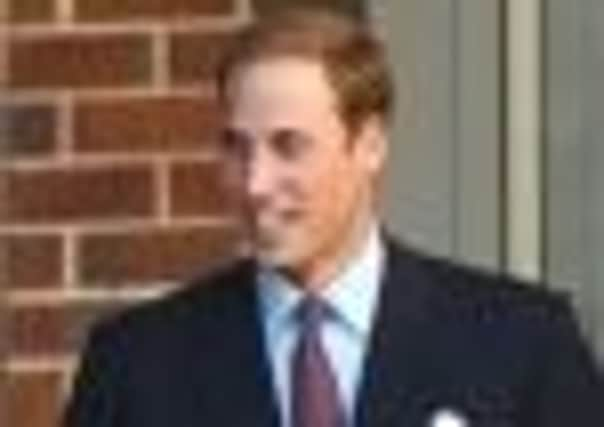Prince William ‘was kept under surveillance by News of the World’


Derek Webb was reportedly paid to follow and record the movements of celebrities picked by the newspaper’s staff.
The investigator said: “Basically, I would write down what they were wearing at the time, what car they were in, who they met, the location they met, the times – the times were very important – and I would keep that.
Advertisement
Hide AdAdvertisement
Hide Ad“And then I would transfer part of it into my diary, but not the actual log itself. Just the names of the people.”
A spokesman for the Duke of Cambridge declined to comment.
Mr Webb said that over eight years he was paid to follow more than 90 targets, including former attorney general Lord Goldsmith and football pundit Gary Lineker.
Relatives, such as the parents of the Harry Potter star Daniel Radcliffe were also targeted, he said.
In 2006, Mr Webb was asked to follow the prince when he was spending a number of days in Gloucestershire, it was claimed.
The investigator, a former policeman, said: “I was working for them extensively on many jobs throughout that time.
“I never knew when I was going to be required. They phoned me up by the day or by the night… It could be anywhere in the country.”
Carrying out surveillance is not illegal and not new for journalists or private investigators.
Mr Webb added: “I got calls from numerous journalists on the newsdesk.”
Advertisement
Hide AdAdvertisement
Hide AdThe private detective said that 90 per cent of his targets were celebrities or politicians.
It was also in 2006 that Mr Webb covertly followed Gary Lineker, a job that lasted a number of weeks.
A News International spokesman said: “We are not able to make any comment around the specific work carried out by Derek Webb. As is well known, the News of the World was closed by News International during the summer.”
Broadcaster Channel 4 said it had also seen the private investigator’s logs, which, it said, named Prince Harry as a target.
Others trailed by Mr Webb included Harry’s ex-girlfriend, Chelsy Davy, and football manager Jose Mourinho, the BBC reported.
The latest revelations add to the perception that the News of the World went beyond acceptable behaviour.
Meanwhile, documents released yesterday showed that News International’s owners, News Group, continued to pay legal fees for former News of the World royal correspondent Clive Goodman as recently as April 2010.
Mr Goodman, jailed in 2007 for eavesdropping on the phones of the royal household, received £9,631.50 from News Group to cover legal fees between February and April last year, said the company’s lawyers, Linklaters.
Advertisement
Hide AdAdvertisement
Hide AdIn a letter to John Whittingdale, the chairman of the Commons culture, media and sport committee, Linklaters said the payments might have been incurred in connection with the committee’s own investigation into the phone-hacking scandal.
The solicitors also confirmed that Mr Goodman had been paid three months’ salary, totalling £22,504, following his guilty plea to hacking charges – including £7,500 after he was dismissed from the News of the World – and received further payments totalling more than £240,000 later in 2007.
Former News International legal affairs manager Tom Crone admitted that he gave incorrect information to the committee about the date when James Murdoch was first informed about the notorious “for Neville” e-mail, which indicated that hacking was not restricted to a single “rogue reporter” on the NoW.
Giving evidence in September, Mr Crone told the committee that he and the then NoW editor, Colin Myler, informed the executive chairman about the e-mail in a meeting on 10 June, 2008 – something Mr Murdoch has denied.
However, documents provided to the inquiry by News International’s former legal advisers, Farrer & Co, suggest that Mr Myler spoke to Mr Murdoch for the first time about the e-mail in a meeting on 27 May, 2008, and that Mr Crone prepared a briefing note ahead of their discussion, setting out the evidence.
Mr Crone said that at the time he gave evidence, he had “no memory” of either the earlier meeting or of the briefing note he wrote. He added it appeared that Mr Myler had also forgotten about them.